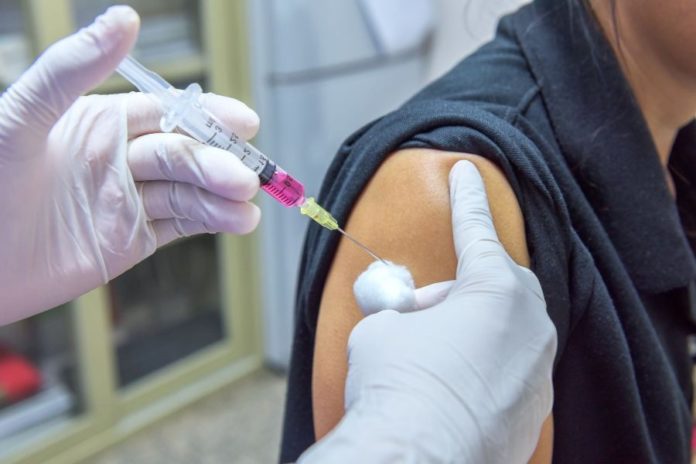Contrary to what the mass media would have us believe, vaccines do NOT “protect” you.
They are NOT the same as antibiotics. They do NOT directly kill viruses.
They teach your immune system how to fight back against specific viruses, fast.
The basic concept works – that’s why nobody has died of smallpox for 40 years.
But every medical procedure carries some risk, so you must weigh the pros and cons of getting the flu shot.
What are Vaccinations?
Essentially, they’re low stakes training programs for your immune system.
When a new type of virus infects you, your immune system does its best to find a weapon to counter it. However, this can take up to two weeks.
In the meantime, the virus is multiplying and spreading.
That’s how people die. The virus does them in before their immune systems can effectively counter-attack.
A vaccine consists of a new virus that’s harmless. It doesn’t multiply, so your immune system learns how to defeat it.
And your immune system remembers. It maintains a vast database of cures.
If an active, living virus of the same kind ever infects you, your immune system remembers how to defeat it, and counter-attacks immediately so you don’t get sick.
The Big Catch
Strong immune systems are better students than weak immune systems. The annual flu shots are aimed at people with the weakest immune systems. The very young, the old, and the immuno-compromised need the shots the most because they are least able to fight off the flu virus.
The Flu Virus Changes Frequently
Unlike smallpox, the flu virus mutates rapidly, constantly creating new strains. That’s why one flu shot is not good for life (as smallpox and others are).
Every February, experts from the United States Centers for Disease Control and Prevention and the United Nations World Health Organization get together and make their best prediction of which four flu strains will strike the Northern Hemisphere next winter. That gives vaccine manufacturers around 6-7 months to manufacture the vaccines for those four particular strains.
Sometimes the expert predictions are accurate; sometimes they’re not.
The 2018-2019 Flu Shot
Last winter, the flu vaccine was overall just 29% effective. Considering all the hoopla and pressure to get a flu shot as though the world depended on it, that’s a weak figure.
The main reason given is that during the spring of 2018 (after February), a new strain of H3N2 flu developed. That’s why the flu shots did not immunize anybody against the new strain. Nearly 57,000 people died from the flu last year.
Should You Get a Flu Shot?
Of course, that’s your decision. There are a lot of rational arguments against them and a lot of rational arguments for them.
The more colds and other infections you suffer, the more you may need a flu shot.
My Best Suggestion
Whether you get the shot or not, strengthen your immune system.
Strong immune systems respond better to all vaccinations.
Strong immune systems are better at defeating all strains of influenza.
Strong immune systems are better at protecting you from ALL infections.
Vitamin D
Vitamin D boosts your immune system. And it has an excellent record of reducing cases of upper respiratory infection.
One reason the flu spreads during the winter is because that’s when all of us living far above the equator don’t get enough sunlight.
In most of the United States, the sun is so weak from April to October you couldn’t make new Vitamin D even if you lay outside naked all day.
Therefore, during the winter, you should take 2,000 I.U. of Vitamin D every day – and take some during the summer depending on how much sun exposure you get.
Fasting for 72 Hours Resets Your Immune System
Dr. Valter Longo of the University of Southern California found that when you fast for three days, your body breaks down and destroys around 40% of the cells of your immune system.
That sounds bad, but it kills only the old, weak, and inefficient cells.
When you begin eating again, your body replaces those old cells with new and efficient immune cells that are virus-killing machines. It’s like modernizing your personal immune system army by replacing rusty muskets with M16s.
Eat Lots of Colorful Foods
An effective immune system must use free radicals to destroy invading bacteria and viruses. Therefore, the cells of your immune system need lots of antioxidants to protect them from damage.
Notice I said “eat” antioxidants, not swallow them in pill form. Studies show supplements are not effective. You need to consume them as whole foods.
Whole foods contain hundreds to thousands of phytonutrients that haven’t even been studied yet. And those are not included in the pills and capsules.
Eat foods of all colors:
Blue: blueberries, black grapes, plums
Yellow-orange: sweet potatoes, carrots, mangoes
Red: tomatoes, bell peppers, strawberries
Green: kale, spinach, arugula
The more color, the better.
Yellow onions have more antioxidants than white onions. Red onions have more antioxidants than yellow onions.
Sleep 8 Hours Every Night
When you don’t sleep enough, that weakens your immune system. The number of cells goes down, leaving you vulnerable to infections.
Vaccines have their place, but they’re not a magic solution to the flu.
Strengthen your immune system, so it is strong enough to kick the butt of any virus and bacteria that tries to infect you.








